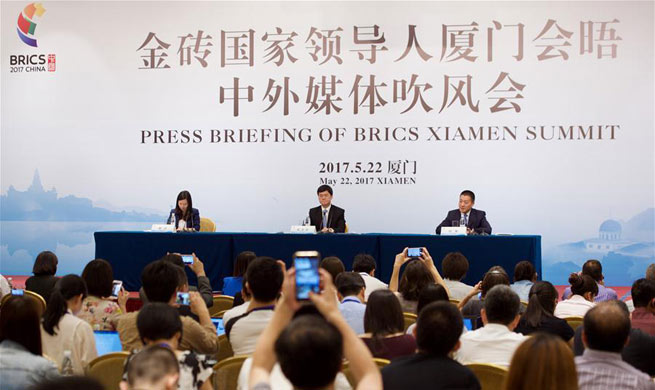VANCOUVER, May 21 (Xinhua) -- A Vancouver-area forum, which brought together government officials, business leaders and scholars, expected the Canadian government on Sunday to participate more actively in the China-proposed Belt and Road Initiative.
"It (Belt and Road Initiative) is not a one-person show, it's a global collective effort," said Guangyu Wang, president of the Grizzly Bear Institute of Canada (GBIC), at the sidelines of the Belt and Road Summit North America Forum held Sunday afternoon at a Richmond business park, just outside of Vancouver in western Canada.
The event was co-hosted by the Institute of Asian Research of the University of British Columbia, and the GBIC, a new think-tank comprised of scholars who focus on Chinese-Canadian relations.
Proposed by China in 2013, the Belt and Road Initiative aims to build trade and infrastructure networks connecting Asia with Europe and Africa on and beyond the ancient Silk Road routes. It comprises the Silk Road Economic Belt and the 21st Century Maritime Silk Road.
Scholars at the forum agreed that Canada would be wise to explore a role in the Belt and Road Initiative.
The United States is Canada's largest trade partner. Canadian officials recently have been fretting over U.S. protectionism as Canada has been dealing with recent U.S. trade attacks against the Canadian softwood lumber and dairy industries.
Liu Fei, China's Consul General in Vancouver, said the Belt and Road Initiative and a potential Canada-China Free Trade Agreement (FTA) would boost bilateral cooperation in areas of fruit, lumber, clean technology, education and tourism.
"People on both sides are looking forward to increased cooperation in other fields," Liu said.
Yves Tiberghien, director of the Institute of Asian Research, and Canada's leading Belt and Road scholar, said at the forum that the Belt and Road Initiative is not a threat to Canada, and that rather, it's an opportunity.
"It's a giant open economic platform of integration of policy interactions," he told Xinhua.
"The only threat is the potential to be left behind. If it generates a lot of momentum, if it redirects a lot of the economic flows, then being left out would not be a good idea," he said.
Tiberghien noted that Canada's participation in the Belt and Road Initiative could lead to more bilateral capital investment and lessen Canada's reliance on the United States in coming years and decades.
"Canada still exports 75 percent of products to the U.S.," he said, noting that only 4.1 percent of Canada's merchandise trade was with China.
"We are highly vulnerable. We just realized it suddenly," he said.

















